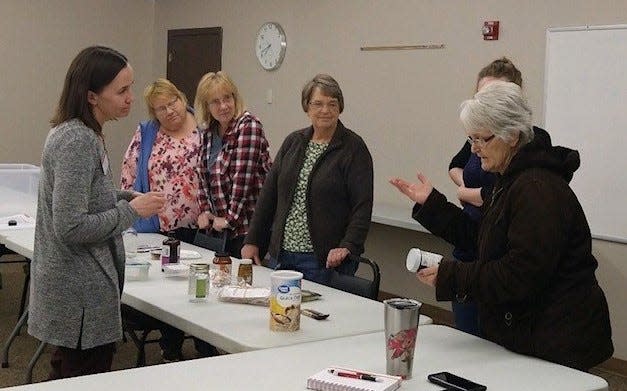How to sell food made at home
Thanks to promotion from the Coshocton Farmers Market, I taught a class last week about selling cottage foods. In Ohio, we have a cottage food law that allows individuals to make certain foods in their own homes to sale in a variety of locations.
It won’t be long before our local famers markets will be opening and ready for our support. If you have ever considered making and selling food yourself, here are some answers to some of the most frequently asked questions I receive.
Can I make food in my home to sell? There is a specific list of the foods that can be made including lots of baked goods (cookies, cakes and pies), jams and jellies and dried mixes. These foods all have minimal risk of causing foodborne illness and do not require temperature control, like refrigeration, to keep them safe for us to eat. There is no inspection of the home kitchen and no fee required. The foods must be properly labeled and have the declaration, “This food is home produced.”
It is possible to make cream pies that require refrigeration or other baked foods that have a higher risk of causing foodborne illness, like cheesecakes, noodles or fry pies. These require a home bakery license from the Ohio Department of Agriculture (ODA). This is $10 per year and requires an inspection. You can learn more about these at agri.ohio.gov/divisions/food-safety.

Can I sell salsa or sauces that I make in my home? Fresh salsas and sauces require refrigeration, so they are not able to be sold fresh. Since these foods require the correct acidity and heat processing to make them a safe canned product, they cannot be made in the home and sold. You can make either of these types of foods in an approved inspected facility. This can be any facility outside of your home that has been approved by ODA including another structure on your property, an ODA registered church kitchen or a shared use facility that co-packs foods.
Can I sell pickles or other fermented vegetables? These products also require specific acidity to make them safe. There is risk that this could be done incorrectly, depending on the recipe used. They can be made in an approved facility where a process authority reviews the ingredients and processing for food safety.
Can I sell no sugar added jams or jellies? The miracle of calcium-gelling pectin is that high sugar is not required to make a jam or jelly set. However, the sugar content of jams and jellies is a large part of what makes them safe to eat. Therefore, no sugar added jams and jellies are a higher risk of foodborne illness and cannot be made at home for sale.
Can I dehydrate or freeze-dry herbs or fruits to sell? This has become a popular question lately as availability of home units has increased. Anything you dehydrate at home cannot be sold, including beef jerky. None of these can be added to other food items for sale either, including dry mixes for dips or soups.
Can I make soaps and lotions to sell? ODA considers these cosmetics and there are specific rules for the production and sale of cosmetics. They can be made in a home, but an inspection is required. You can learn more about all these rules on the ODA Food Safety website.
Today I’ll leave you a quote from Thomas A. Edison: “Many of life’s failures are people who did not realize how close they were to success when they gave up.”
Emily Marrison is an OSU Extension Family & Consumer Sciences Educator and may be reached at 740-622-2265.
This article originally appeared on Coshocton Tribune: How to sell food made at home
